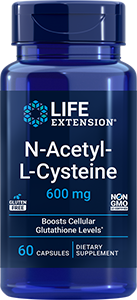
Glutathione vs. NAC: Which Antioxidant Is Best for Your Liver?
Published: July 2024
Antioxidants! We've all heard of them, and we all probably at least have some idea what they are. (Something to do with blueberries?) But did you know that your body creates its own?
Glutathione is sometimes referred to as the "master antioxidant" in the body, with a protective role in the liver, a hardworking organ that needs particular protection from oxidative stress.
Speaking of the liver, you may also have heard of NAC, a popular liver health supplement. In fact, people often mention them both in one breath, as in: "NAC is a precursor to glutathione." (A precursor is a compound that is used to form another compound, generally through metabolic reactions inside the body.)
So which one, if either, is better to take as a supplement? Should you just go straight to the source and supplement with glutathione, or are there advantages to taking NAC instead?
In this blog, we've got all you need to know about these superheroes and their impact on your liver health!
Why do antioxidants help the liver?
Before we dive into the similarities and differences between NAC and glutathione, let's first talk about why your liver needs these champions.
Your liver is a marvel, make no mistake. Roughly 13% of your total blood supply is in your liver at this very moment—over the course of a day, your liver filters more than 250 gallons of blood! It serves numerous essential functions, including:
Detoxification
– The liver helps protect against insults from foreign compounds as well as substances formed as metabolic byproducts.Bile production and secretion
– Bile is important for your body to digest fats.Glycogen storage
– The liver synthesizes and stores glycogen, which is a way to keep a glucose reserve for the "long term."Digestion and metabolism
– In addition to its roles in glucose storage and producing bile for fat metabolism, the liver also helps produce and break down amino acids as well as synthesize cholesterol.
But all that work and filtering out toxins means that liver cells are exposed to a lot of things that can damage them! Just as the water filter under your sink or the air filters in your air conditioner requires regular maintenance, your liver needs constant maintenance.
And in fact, the liver is exceptionally adept at regenerating itself. But there are ways you can offer your liver some added support (we'll discuss more ways below!) including methods to replenish glutathione levels, like NAC supplements. After all, why wouldn't you want to offer your liver that extra help to ensure it works at its best?
What's the difference between glutathione and NAC?
The difference between these two antioxidants really comes down to how your body produces them. As we've mentioned, NAC, or N-acetyl-L-cysteine (also sometimes written as N-acetyl cysteine or N-acetylcysteine) is a precursor to glutathione.
NAC is a special form of the amino acid L-cysteine (it's "acetylated", aka, acetylcysteine). In the body, it is broken down into L-cysteine and then further metabolized by connecting it to glutamate and glycine to form glutathione. In addition to being a precursor to glutathione, NAC is an antioxidant in its own right.
Glutathione and NAC both act as powerful antioxidants. Antioxidants fight off oxidative stress by quenching free radicals—reactive compounds that can impact cells and tissues in the body. Without them, free radicals are indeed "free" to cause oxidative stress.
Unfortunately, glutathione levels, like so many other aspects of health, tend to decline with age, and when that happens, those pesky free radicals can really run amok. That's why many turn to supplementation, like with NAC, to help replenish glutathione, and, in the process, support liver health and function.
And yes, blueberries (and plenty of other foods) do contain antioxidants—so good nutrition will give you lots of external sources of antioxidants. These are called exogenous, meaning they come from outside the body, while endogenous antioxidants, like glutathione, are made inside the body.
Glutathione and NAC are also fairly exceptional due to their thiol group, which contains sulfur. Sulfur is particularly reactive and able to directly neutralize free radicals. (It also has a fairly distinctive smell, which you probably noticed if you ever opened a bottle to take NAC.)
What is better, glutathione or NAC?
Deciding whether you should take NAC or glutathione? Well, glutathione and NAC are both powerful antioxidants, but they each serve additional roles in your body. For example, while NAC is known for its ability to boost glutathione, that's not its only calling card.
Some additional benefits of NAC include:
Immune health
– NAC can help support a healthy immune response. For example, in one study in postmenopausal women, 600 mg of NAC daily improved various markers of immune function and oxidative stress.Bronchial and respiratory health
– NAC administration has been shown to promote healthy lung function. In the body, NAC helps break down mucus for easier clearance.Liver health
– NAC is particularly well known for its effects on liver health, supporting healthy levels of liver enzymes and other markers of liver function.
So, ultimately NAC supplements have benefits for the whole body and support quality of life and general well-being. And NAC's benefits as a supplement have been more studied in the scientific community.
On the other hand, glutathione is no slouch either! It scavenges free radicals and prevents them from causing unwanted reactions. Glutathione also acts as a cofactor for lots of important enzymes in the body—including detoxification enzymes like glutathione-S-transferases. These enzymes help the body, and especially the liver, to eliminate toxins from the body.
Heads-up: Choosing the Right Glutathione Supplement
Important note about glutathione supplements: it's important that you choose one that offers the reduced form. Reduced means the glutathione is in its active, scavenging form. When it quenches a free radical, it becomes oxidized and cannot quench more free radicals until it is converted back to its reduced form by special enzymes.
Think of it as being switched on or off! The ratio between oxidized and reduced glutathione in the body is an indicator of oxidative stress and cellular health.
Can you take glutathione and NAC together?
Yes! In fact, they are often combined with each other or with other nutrients and amino acids for added benefits. For example, they may be combined with vitamins C and E, or phytonutrients such as extracts from clove or green tea. As part of a healthy lifestyle, including proper nutrition and physical activity, NAC and glutathione are an excellent addition.
What else can you do to support liver health?
There are lots of ways you can support your liver, from lifestyle changes to dietary supplements. And a fair warning: most of this list will look pretty familiar! What's good for the liver is generally good for every aspect of health. There's no way to overstate it, a healthy lifestyle is key if you want to improve your physical and mental health!
Here are some ways you can help your liver out:
- Avoid consuming things you know are a challenge for the liver! Excessive alcohol, added sugars and unhealthy fats have a significant impact on your liver and body.
- Conversely, fiber-rich diets with plenty of plant-based foods are associated with better liver health. And as a plus, healthful dietary patterns like the DASH and Mediterranean diets may improve glutathione levels and oxidative stress, so win-win.
- Exercise, exercise, exercise! You want to aim for at least 150 minutes of moderate intensity exercise each week, including at least two days of strength training, but don't be afraid to do more if your body is up for it.
- Maintain a healthy weight. Reaching (and maintaining!) a healthy weight can support liver health.
- Get enough high-quality sleep.
- Stay hydrated! Remember, the liquid portion of your blood (plasma) is mostly water.
- Get your liver enzymes checked regularly—they're included in most regular bloodwork panels, so make sure you schedule that annual wellness checkup.
- Consider trying a liver health supplement. There are so many supplements out there that can be beneficial for your liver, from milk thistle to certain probiotics to NAC.
Pro tip: if you aren't sure where to start with supplements, try a health quiz!
You've only got one liver, so do your best to treat it kindly!
References
- Arranz L, et al. "The glutathione precursor N-acetylcysteine improves immune function in postmenopausal women." Free Radic Biol Med. November 2008. https://pubmed.ncbi.nlm.nih.gov/18694818/
- Atkuri KR, et al. "N-Acetylcysteine--a safe antidote for cysteine/glutathione deficiency." Curr Opin Pharmacol. August 2007. https://pubmed.ncbi.nlm.nih.gov/17602868/
- Bettermann EL, et al. "Higher Mediterranean Diet Quality Scores and Lower Body Mass Index Are Associated with a Less-Oxidized Plasma Glutathione and Cysteine Redox Status in Adults." J Nutr. February 2018. https://pubmed.ncbi.nlm.nih.gov/29490099/
- Gong J, et al. "Hepatocytes: A key role in liver inflammation." Front Immunol. January 2023. https://www.ncbi.nlm.nih.gov/pmc/articles/PMC9890163/
- Jiang C, et al. "Systematic review and meta-analysis of the efficacy of N-acetylcysteine in the treatment of acute exacerbation of chronic obstructive pulmonary disease." Ann Palliat Med. 2021. https://cdn.amegroups.cn/journals/amepc/files/journals/8/articles/72787/public/72787-PB3-5323-R2.pdf
- Marjot T, et al. "Sleep and liver disease: a bidirectional relationship." The Lancet Gastroenterology & Hepatology. October 2021. https://www.sciencedirect.com/science/article/abs/pii/S2468125321001692
- Ortolani O, et al. "The effect of glutathione and N-acetylcysteine on lipoperoxidative damage in patients with early septic shock." Am J Respir Crit Care Med. June 2000. https://pubmed.ncbi.nlm.nih.gov/10852765/
- Owen JB, Butterfield DA. Measurement of Oxidized/Reduced Glutathione Ratio. January 2010. https://link.springer.com/protocol/10.1007/978-1-60761-756-3_18
- Pirouzeh R, et al. "Effect of DASH diet on oxidative stress parameters: A systematic review and meta-analysis of randomized clinical trials." Diabetes Metab Syndr. November-December 2020. https://pubmed.ncbi.nlm.nih.gov/33395773/
- Raghu G, et al. "The Multifaceted Therapeutic Role of N-Acetylcysteine (NAC) in Disorders Characterized by Oxidative Stress." Curr Neuropharmacol. 2021. https://pubmed.ncbi.nlm.nih.gov/33380301/
- Sukumaran D, et al. "A study to evaluate the hepatoprotective effect of N- acetylcysteine on anti tuberculosis drug induced hepatotoxicity and quality of life." Indian J Tuberc. July 2023. https://pubmed.ncbi.nlm.nih.gov/37562904/
- Wei J, et al. "Effect of Orally Administered N-Acetylcysteine on Chronic Bronchitis: A Meta-analysis." Adv Ther. December 2019. https://pubmed.ncbi.nlm.nih.gov/31598901/
- "Cells that maintain and repair the liver identified." National Institutes of Health. March 2021. https://www.nih.gov/news-events/nih-research-matters/cells-maintain-repair-liver-identified
- "The Healthy Liver." American Liver Foundation. September 2023. https://liverfoundation.org/about-your-liver/how-liver-diseases-progress/the-healthy-liver/
Always be in the know!
Access the latest deals, wellness news, expert health tips & more!











